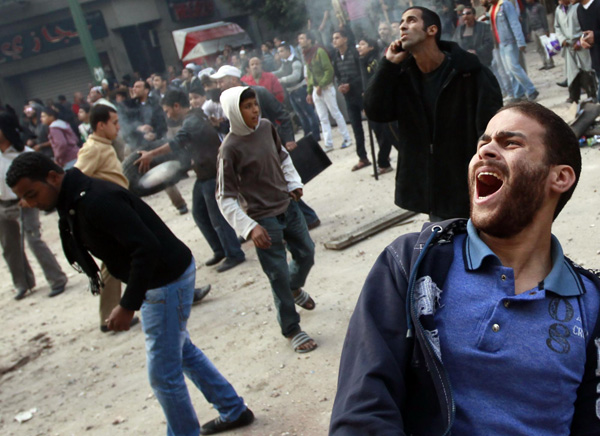8 dead, 299 injured in new clashes in Cairo
 0 Comment(s)
0 Comment(s) Print
Print E-mail
Xinhua, December 17, 2011
E-mail
Xinhua, December 17, 2011
|
|
|
A protester throws stones at army soldiers inside a cabinet building near a burning police booth during clashes in Cairo Dec 16, 2011. [Photo: Agencies via China Daily] |
A student from Cairo University, who worked as a volunteer to treat the injured at a makeshift tent, said one of the dead was caused by gunshots and the injuries were mostly caused by stones and petrol bombs.
The demonstrators opposed the ruling military council's appointment of 78-year-old Kamal el-Ganzouri as the new prime minister on Nov. 25 and demanded an immediate transfer of power.
The Muslim Brotherhood's Freedom and Justice Party condemned the violence and warned of attempts to drag Egypt into a contrived crisis, MENA said.
In a statement, the party said those responsible for fomenting tensions intended to prevent the peaceful transition of power through the parliamentary elections. It called on all authorities concerned to shoulder their responsibility in halting the violence immediately.
Mohamed El-Baradei, former IAEA chief and now a potential presidential candidate, criticized on its Twitter the way the clashes were dealt with Friday.
The Freedom and Justice Party has been doing well in the first stage of the People's Assembly polls held on Nov. 28-29. It won 36. 6 percent of the votes with the Salafist Nour Party coming second in the first round.
The latest clashes happened just after the end of the second stage vote on Dec. 14-15 in nine governorates including Giza and Suez. The third stage of the People's Assembly polls will be held in early January.
But the violence raised new concerns about the country's stability and the credibility of the new government. Ganzouri has given top priority to the restoration of security and revival of the economy.
Small protests also erupted in Alexandria and Suez Friday in response to the clashes in Cairo. Some youth activists called for demonstrations Saturday.
Prior to the country's landmark parliamentary elections that started on Nov. 28, protests and clashes between protesters and security forces had left 42 people dead and thousands injured. The cabinet led by Prime Minister Essam Sharaf resigned after the worst violence since the fall of former President Hosni Mubarak in February.
Violent protests are common in Egypt since Mubarak stepped down. Protestors have different demands on different occasions. The instability has dealt a heavy blow to the country's economy, which relies much on tourism and foreign investment. Tourism revenue is expected to fall by around 30 percent this year, the tourism ministry says.






